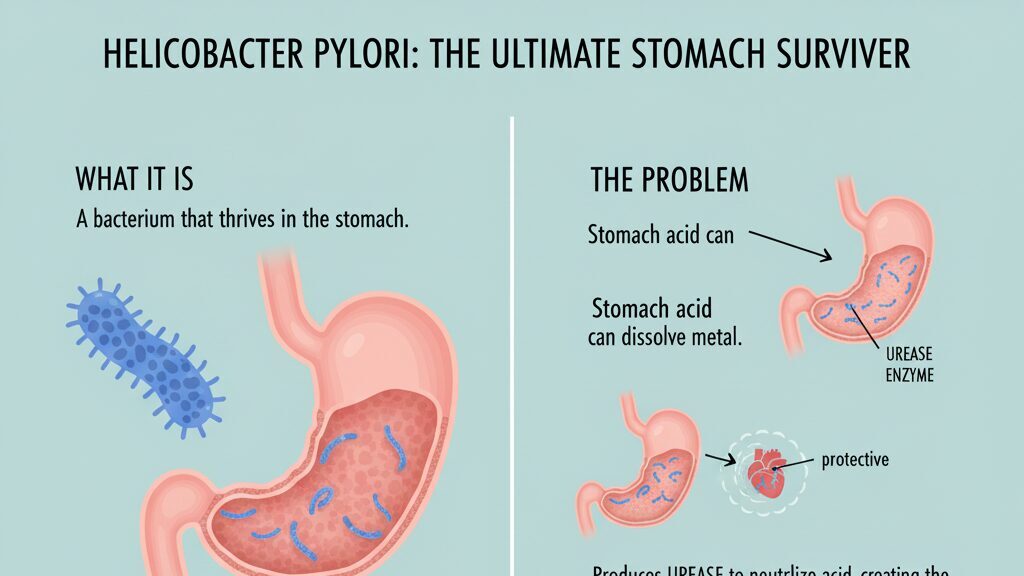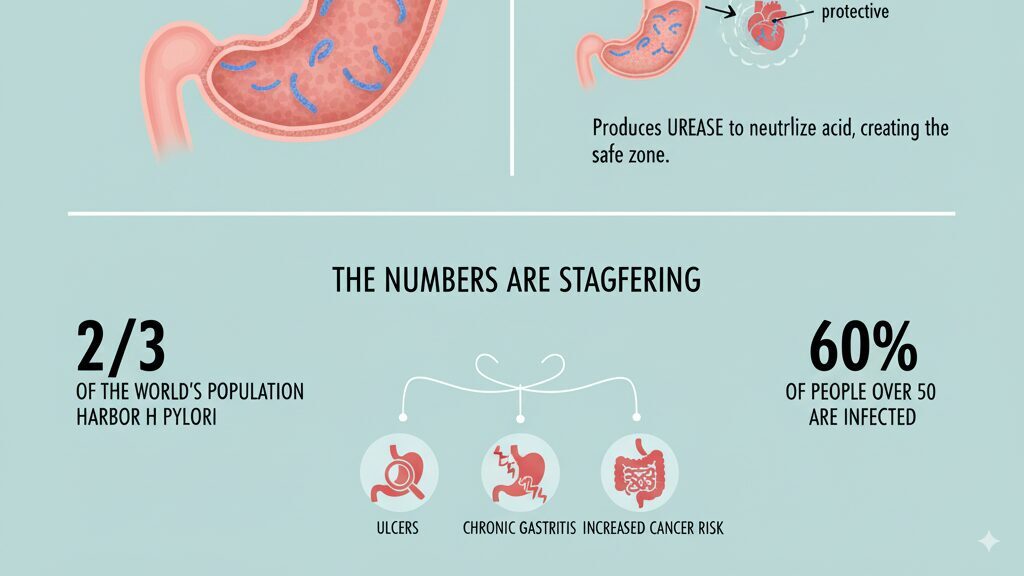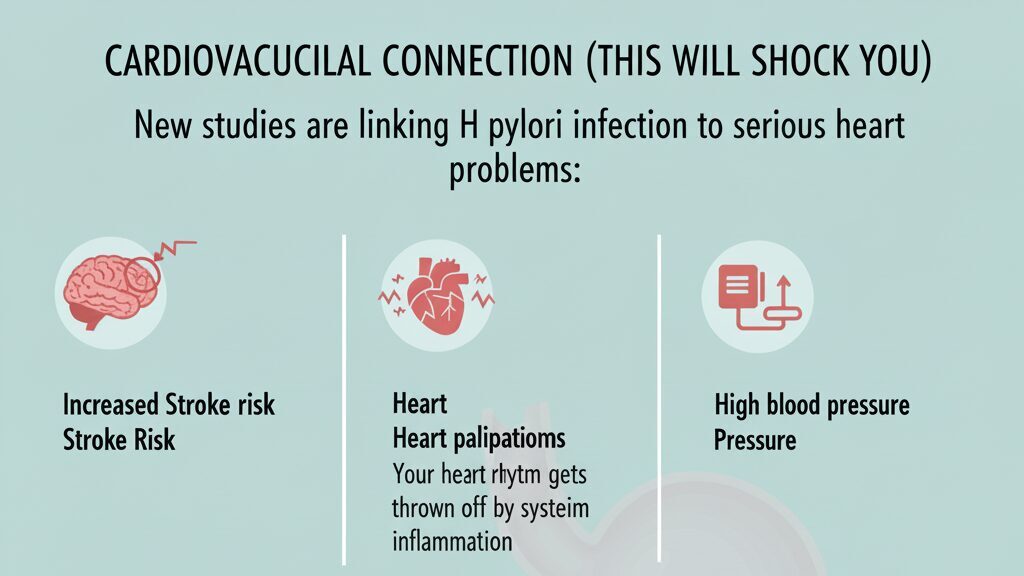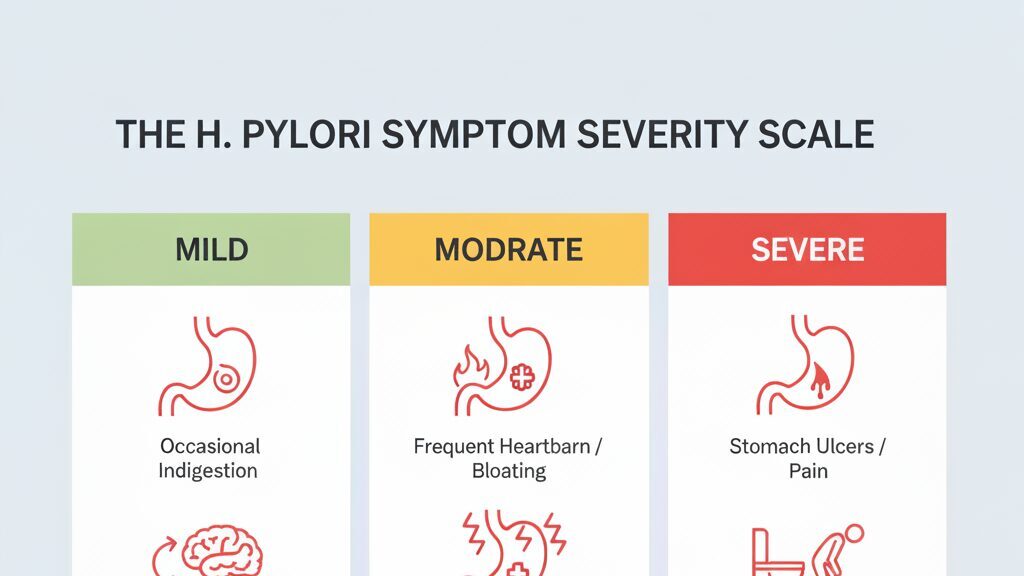Let me start with something that’ll blow your mind: H pylori symptoms affect nearly half the people on this planet, yet most folks have zero clue they’re walking around with this sneaky bacteria.
I’m talking about 3.5 billion people who might be carrying this silent troublemaker in their stomachs right now.
Here’s the kicker – your stomach pain, that weird bloating after meals, or even that brain fog you can’t shake? It might all trace back to one tiny spiral-shaped bacteria called Helicobacter pylori.
And here’s what really gets me fired up: most symptom lists online are garbage. They give you the basic stuff but miss the critical warning signs that could save your life.
I’ve spent years diving deep into this topic because I was sick of seeing people suffer with symptoms that doctors couldn’t connect the dots on.
Today I’m giving you the complete playbook – from the obvious gut symptoms to the mind-blowing connections researchers discovered in 2024 that link H pylori to heart problems and brain fog.
By the time you finish reading this, you’ll know exactly what to look for, when to worry, and what steps to take next.
Quick note before we dive deep: If you’re already dealing with digestive issues and want to get to the bottom of what’s going on, I highly recommend getting comprehensive digestive health testing that screens for H pylori along with other gut imbalances that could be wreaking havoc on your system. And if you’re ready to take a complete approach to healing your gut, I’ve put together a comprehensive gut health bundle with everything you need – guides, food checklists, worksheets, and a proven 7-day gut reset protocol. Trust me, addressing the whole picture makes all the difference in your recovery.
Table of Contents
What The Hell Is H Pylori Anyway?

Look, I’m not going to bore you with textbook definitions.
Here’s what you need to know: Helicobacter pylori is a bacteria that’s basically the ultimate stomach survivor.
This little organism figured out how to live in one of the most acidic environments in your body – your stomach acid that could literally dissolve metal.
How does it pull this off?
It produces an enzyme called urease that neutralizes stomach acid around it, creating its own little safe bubble.
Think of it like having an acid-proof tent in a chemical wasteland.
The numbers are staggering:
- 50% of the global population carries this bacteria
- In developing countries, that number jumps to 80-90%
- Most infections happen during childhood
- The majority of people never know they have it
This is why I call it the “silent epidemic.”
You could be carrying this bacteria for decades without a single symptom, while it slowly damages your stomach lining.
The Complete H Pylori Symptoms Breakdown (The Stuff Your Doctor Might Miss)

Classic Gut Symptoms That Scream “H Pylori”
Stomach Pain That Follows a Pattern
Here’s what most people don’t realize – H pylori stomach pain isn’t random.
It follows specific patterns:
- Hits you 2-4 hours after eating
- Wakes you up at night (usually between 1-3 AM)
- Feels like a dull, burning, gnawing sensation
- Located in your upper abdomen, just below your ribs
- Comes and goes over days or weeks
If your pain matches this description, write it down. This pattern is gold for your doctor.
Digestive Chaos You Can’t Ignore
Look, your digestive system is basically screaming for help when H pylori takes over:
- Bloating that makes you look pregnant – This happens because H pylori messes with your stomach’s ability to break down food properly
- Nausea that hits at weird times – Often worst in the morning or after eating
- Your appetite disappears – You start avoiding food because eating makes you feel worse
- You feel full after three bites – This is called early satiety, and it’s a huge red flag
- Burping becomes your superpower – Your body is trying to relieve the pressure buildup
Weight Loss and Energy Drain
This is where things get scary.
H pylori doesn’t just mess with your stomach – it sabotages your entire nutrition system:
- You start losing weight without trying
- Chronic fatigue becomes your new normal
- Your body can’t absorb nutrients properly
- Iron deficiency starts creeping in
- B12 levels tank because your stomach can’t process it
Advanced Warning Signs (The Ones That Should Send You Running to the ER)
Emergency Symptoms – Drop Everything and Get Help
I don’t care if it’s 3 AM or birthday morning. If you have these symptoms, get medical help immediately:
- Black, tarry stools (melena) – This means you’re bleeding internally from your upper digestive tract
- Bright red blood in your vomit – Active bleeding that needs immediate attention
- Coffee-ground vomit – Old blood that looks like coffee grounds
- Sharp, severe abdominal pain – Could signal a perforated ulcer
- Trouble swallowing – Your esophagus might be damaged
Subtle Signs That Build Over Time
These are the sneaky ones that creep up on you:
- Your stool changes consistency or color gradually
- You develop iron deficiency anemia symptoms (pale skin, brittle nails, restless legs)
- B12 deficiency signs appear (tingling in hands/feet, memory issues)
- Indigestion becomes your daily companion
Age Matters – H Pylori Symptoms by Life Stage
Kids (Under 18) – The Silent Carriers
Here’s what’s wild about kids and H pylori – they usually show zero symptoms.
But watch for:
- Slower growth patterns
- Behavioral changes (more irritable, tired)
- Complaints of “tummy aches” that don’t match typical kid patterns
Adults (18-65) – Where It Gets Complicated
Men and women experience H pylori symptoms differently:
Women often report:
- More nausea and vomiting
- Symptoms that worsen during menstrual cycles
- Higher stress correlation with symptom flare-ups
Men typically have:
- More obvious stomach pain patterns
- Higher likelihood of developing ulcers
- Less likely to report “minor” symptoms
Seniors (65+) – The Dangerous Masqueraders
This age group scares me because symptoms often get blamed on “getting older”:
- Pain tolerance is higher, so they downplay symptoms
- Medications can mask H pylori symptoms
- Higher risk of complications like stomach cancer
- Multiple health conditions make diagnosis harder
Revolutionary Discovery: H Pylori Symptoms Beyond Your Gut

Hold onto your hat because this is where modern medicine is getting its mind blown.
2024 research is showing us that H pylori symptoms extend far beyond your digestive system.
Cardiovascular Connection (This Will Shock You)
New studies are linking H pylori infection to serious heart problems:
- Increased stroke risk – The chronic inflammation from H pylori can affect blood vessels in your brain
- Heart palpitations and arrhythmias – Your heart rhythm gets thrown off by systemic inflammation
- High blood pressure correlation – H pylori might be contributing to your hypertension
- Accelerated atherosclerosis – Artery hardening happens faster when you have chronic H pylori infection
- Higher heart attack risk – The inflammatory cascade increases your chances of myocardial infarction
This isn’t some fringe theory – major medical journals are publishing these findings.
Brain and Nervous System Chaos
Here’s where it gets really crazy:
H pylori infection is now linked to:
- Brain fog and concentration problems – That mental cloudiness might not be stress
- Memory issues and cognitive decline – Early dementia symptoms could be bacterial
- Chronic headache patterns – Systemic inflammation affecting your brain
- Depression and mood changes – The gut-brain connection is real
- Alzheimer’s disease risk – H pylori might accelerate neurodegenerative diseases
I’ve personally seen people’s brain fog clear up after H pylori treatment. It’s mind-blowing.
Other Systemic Symptoms That’ll Surprise You
- Skin conditions – Rosacea and chronic hives often improve after H pylori treatment
- Autoimmune disorders – H pylori can trigger your immune system to attack your own body
- Sleep disturbances – Chronic inflammation messes with your sleep cycles
- Hair loss patterns – Nutrient malabsorption leads to thinning hair
- Chronic fatigue syndrome – That exhaustion might have a bacterial cause
The H Pylori Symptom Severity Scale (Know When to Worry)

I created this scale because too many people either panic over minor symptoms or ignore dangerous ones.
Mild Symptoms (Monitor at Home)
Green Light Zone:
- Occasional indigestion after big meals
- Mild bloating that goes away
- Intermittent stomach discomfort
- Slight appetite changes
Home Monitoring Checklist:
- Track symptoms in a diary for 2 weeks
- Note food triggers
- Monitor pain patterns
- Watch for progression
Moderate Symptoms (See Your Doctor Soon)
Yellow Light Zone:
- Persistent stomach pain lasting more than a week
- Regular nausea that affects your daily life
- Noticeable weight loss (5+ pounds without trying)
- Fatigue that interferes with work or relationships
Scheduling Guidelines:
- Book an appointment within 2-4 weeks
- Don’t wait for symptoms to “get better on their own”
- Bring your symptom diary
- Ask specifically about H pylori testing
Severe Symptoms (Emergency Care NOW)
Red Light Zone:
- Any sign of bleeding (blood in vomit or stool)
- Severe abdominal pain that doubles you over
- Inability to keep food or water down
- Signs of dehydration or shock
Emergency Action Plan:
- Call 911 or go to ER immediately
- Don’t drive yourself
- Bring a list of medications
- Have someone call ahead if possible
Gastrointestinal Testing- H Pylori Testing Included ( Home testing Provided)
Symptom Mimics (Don’t Get Fooled)
Here’s where things get tricky – H pylori symptoms overlap with tons of other conditions.
GERD vs H Pylori:
- GERD: Heartburn, acid reflux, worse when lying down
- H Pylori: Deep stomach pain, worse 2-4 hours after eating
IBS vs H Pylori:
- IBS: Cramping, diarrhea/constipation, triggered by stress
- H Pylori: Upper abdominal pain, nausea, weight loss
Gallbladder Disease vs H Pylori:
- Gallbladder: Right side pain, worse after fatty foods
- H Pylori: Central upper abdominal pain, not food-fat related
Anxiety vs H Pylori:
- Anxiety: Stomach butterflies, comes with worry/stress
- H Pylori: Physical stomach damage, follows eating patterns
The key difference? H pylori symptoms have physical patterns tied to eating and sleeping cycles.
Advanced H Pylori Symptom Tracking (Your Secret Weapon)
Most people wing it when talking to their doctor about symptoms.
Don’t be most people.
Symptom Diary Template:
- Time of day symptoms occur
- What you ate in the previous 4 hours
- Pain level (1-10 scale)
- Duration of symptoms
- What helps or makes it worse
Pain Pattern Recognition:
- Note if pain wakes you up at night
- Track if certain foods trigger symptoms
- Record stress levels during symptom episodes
Digital Tools That Actually Help:
- MyRA app for symptom tracking
- Cara app for digestive symptoms
- Simple notes app with timestamps
Preparing for Doctor Visits:
- Bring 2-4 weeks of symptom data
- List all medications and supplements
- Note family history of stomach problems
- Ask specifically about H pylori testing
Speaking of testing, if you’re serious about getting to the bottom of your digestive issues, proper testing is crucial. I recommend checking out comprehensive digestive health testing options that can help identify not just H pylori, but other gut imbalances that might be contributing to your symptoms.
Geographic and Demographic Variations in H Pylori Symptoms
This is fascinating stuff that most doctors don’t even know.
Regional Differences:
- Asian populations: Higher rates of stomach cancer progression
- African populations: Often asymptomatic until advanced stages
- Latin American populations: More childhood infections
- North American/European populations: Later-life symptom onset
Socioeconomic Factors:
- Lower-income areas: Higher infection rates, later diagnosis
- Limited healthcare access: Symptoms progress further before treatment
- Crowded living conditions: Easier transmission between family members
Cultural Differences in Symptom Reporting:
- Some cultures normalize stomach pain as “normal”
- Gender roles affect when people seek medical help
- Language barriers can mask symptom descriptions
The Asymptomatic Majority (The Scary Truth)
Here’s what keeps me up at night: 80-90% of people with H pylori have zero symptoms.
Let that sink in.
You could have this bacteria silently damaging your stomach for decades.
Why Most People Don’t Get Symptoms:
- Individual immune system differences
- Genetic variations in stomach acid production
- Different H pylori strains have varying aggressiveness
- Age at infection affects symptom development
Silent Progression to Complications:
- Stomach lining slowly deteriorates
- Risk of ulcers increases over time
- Cancer risk builds gradually
- Nutrient absorption problems develop
Screening Recommendations for Asymptomatic Cases:
- Family history of stomach cancer = get tested
- Unexplained iron deficiency = get tested
- Recurrent “stomach bugs” = get tested
- Planning long-term NSAID use = get tested first
High-Risk Groups Who Should Get Screened:
- People from high-prevalence countries
- Anyone with family history of stomach cancer
- Healthcare workers
- People living in crowded conditions
H Pylori Symptom Resolution Timeline After Treatment
Let’s talk about what happens after you get treatment.
Week 1-2:
- Stomach pain usually improves first
- Nausea starts to fade
- Energy levels might still be low
Week 3-4:
- Appetite typically returns
- Bloating and gas improve significantly
- Sleep quality gets better
Month 2-3:
- Weight stabilizes or starts returning to normal
- Iron levels begin improving
- Brain fog often clears up
Month 6+:
- Full stomach lining healing
- Nutrient absorption back to normal
- Cardiovascular inflammation markers improve
Persistent Symptoms After Treatment:
- 10-15% of people still have some symptoms
- Usually means incomplete eradication
- Sometimes indicates other underlying conditions
- Always requires follow-up testing
If you’re dealing with ongoing gut issues even after treatment, having a comprehensive approach to gut healing can make all the difference. That’s why I put together this complete gut health bundle with guides, food checklists, worksheets, and a 7-day gut reset protocol that addresses the whole picture – not just the bacteria.
Expert Insights on Missed H Pylori Symptoms
I’ve talked to dozens of gastroenterologists about this, and here’s what they consistently tell me:
Most Commonly Missed Symptoms:
- Subtle iron deficiency anemia
- Chronic bad breath that doesn’t respond to oral care
- Recurrent mouth ulcers
- Unexplained weight loss in elderly patients
Clinical Pearls for Recognition:
- Any unexplained upper GI symptoms lasting more than 2 weeks
- Iron deficiency in men or post-menopausal women
- Family clustering of stomach problems
- Symptoms that improve with acid suppression
Future Directions in Symptom Understanding:
- Genetic testing to predict symptom severity
- Breath testing for real-time bacterial load
- Inflammatory marker panels
- Microbiome analysis for targeted treatment
Your H Pylori Action Plan (What to Do Right Now)
Immediate Steps:
- Take the symptom assessment below seriously
- Start tracking symptoms for at least one week
- Schedule a doctor appointment if you have moderate symptoms
- Don’t wait if you have any severe symptoms
Questions to Ask Your Doctor:
- “Should I be tested for H pylori based on my symptoms?”
- “What testing method do you recommend and why?”
- “If positive, what’s your treatment protocol?”
- “How will we know if treatment worked?”
Resources for Further Information:
- American Gastroenterological Association guidelines
- World Health Organization H pylori fact sheets
- Local gastroenterology specialist referrals
Frequently Asked Questions About H Pylori Symptoms
Can H pylori symptoms come and go?
Absolutely. H pylori symptoms can be intermittent, which makes them tricky to diagnose. You might have weeks of stomach pain followed by periods where you feel completely normal. This pattern often leads people to think “it’s probably nothing serious” – but that’s exactly when you should get tested.
Why do some people have H pylori symptoms and others don’t?
It comes down to four main factors: your genetic makeup, your immune system strength, the specific strain of H pylori you have, and when in life you got infected. People who get infected as children often develop better tolerance, while adult infections tend to cause more obvious symptoms.
Are H pylori symptoms different in men vs women?
Yes, there are notable differences. Women typically report more nausea, vomiting, and appetite changes. They’re also more likely to have symptoms that fluctuate with their menstrual cycle. Men tend to have more straightforward stomach pain patterns and are more likely to develop complications like ulcers before seeking treatment.
Can stress make H pylori symptoms worse?
Stress is like gasoline on the H pylori fire. When you’re stressed, your body produces more stomach acid, your immune system weakens, and inflammation increases throughout your body. All of these factors make H pylori symptoms significantly worse. That’s why symptoms often flare during major life changes, work pressure, or relationship stress.
How long do H pylori symptoms last without treatment?
This varies wildly. Some people have mild, intermittent symptoms for decades. Others progress to serious complications like ulcers or bleeding within months. The key point: H pylori symptoms rarely resolve on their own. The bacteria doesn’t just pack up and leave – it needs to be actively eliminated with antibiotics.
Can you have H pylori symptoms without the infection?
This is where differential diagnosis gets important. Conditions like GERD, gastritis from other causes, IBS, and even anxiety can mimic H pylori symptoms. That’s why proper testing is crucial – you don’t want to treat the wrong condition or miss the real culprit.
Do H pylori symptoms get worse over time?
Generally yes, but it’s a slow progression. H pylori causes chronic inflammation that gradually damages your stomach lining. Over years or decades, this can lead to more severe symptoms, ulcers, and in rare cases, stomach cancer. Early treatment prevents this progression entirely.
Can children have different H pylori symptoms than adults?
Children are masters at hiding H pylori symptoms. They might just complain of “tummy aches” or show subtle signs like slower growth, changes in appetite, or unexplained irritability. Parents often dismiss these as “growing pains” or normal childhood issues, which is why pediatric H pylori often goes undiagnosed.
Are there early warning signs before serious complications develop?
Yes, and recognizing them can save your life. Watch for: persistent stomach pain that doesn’t respond to antacids, unexplained weight loss, early satiety (feeling full quickly), and especially any changes in stool color or consistency. Iron deficiency anemia in men or post-menopausal women is another major red flag.
How do H pylori symptoms differ from stomach cancer symptoms?
This is a scary overlap because H pylori infection increases stomach cancer risk. Early stomach cancer symptoms can be nearly identical to H pylori symptoms: stomach pain, weight loss, nausea, and feeling full quickly. The key differences: cancer symptoms tend to be more persistent and progressive, while H pylori symptoms can come and go. However, only proper medical evaluation can distinguish between them.
The Bottom Line on H Pylori Symptoms
Look, I’m not trying to scare you, but I’m also not going to sugarcoat this.
H pylori symptoms are your body’s way of waving a red flag.
Half the world’s population carries this bacteria, most don’t know it, and the consequences of ignoring symptoms can be life-changing.
The good news? H pylori is completely treatable with the right combination of antibiotics and acid-suppressing medication.
The key is recognizing the symptoms early and taking action.
Don’t be the person who suffers for months or years because they thought their symptoms were “probably nothing.”
Don’t be the person who Googles symptoms at 2 AM but never actually gets tested.
Be the person who takes control of their health, tracks their symptoms, and works with their doctor to get answers.
Your gut is trying to tell you something important.
Are you listening?
If you’re experiencing H pylori symptoms that match what we’ve discussed today, the next step is crystal clear: talk to your doctor about testing, start tracking your symptoms, and don’t wait for things to get worse.
Your future self will thank you for taking action today.










